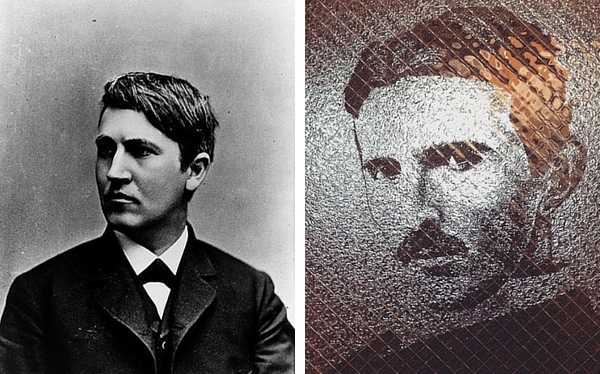Contextual Definitions
An Edison: A person who has the ability to gather the right amount of geniuses in a room, make them work for him to produce inventions and then properly brand his name on them.
A Tesla: An idealistic genius with the ability to look at existing inventions and improve upon them, or create new inventions of his own.
For the past few days, I have been doing a lot of reading on business competition and rivalry. I have discovered a lot of new things. For one, I have learned more about Tesla, and his rivalry with Thomas Edison than I ever did in all my years in school. I found that Thomas Edison was more of a businessman than a traditional inventor, while Tesla was more of the latter. The debate as to who is a better inventor is still ongoing, with the arguments for Tesla holding more water, and the arguments against Edison carrying more venom. Many have branded Edison a thief, making out Tesla to be a saint. But I doubt that is the complete picture.
Thomas Edison is credited with 1,093 patents, which is a phenomenal amount – the most of any scientist until 2003. But then you have to take into consideration the fact that he worked with the support of many assistants over the years. Also, he bought a lot of those patents.
Tesla, on the other end, did not have the luxury of assistants and money. With his eidetic memory and wild mind, he gathered less than 300 patents. What Tesla really was, was an inventor. He wasn’t a [good] businessman. Despite all his breakthrough inventions, he died poor and alone in 1943.
If you asked me “Would you rather have a Tesla work for you in a startup or an Edison?” I would reply, “Why can’t I have both?” (As a Nigerian who likes to answer questions with questions).
Edison’s ability to scout and manage the talents of other people, mostly for personal gain, is not something to spite, in my opinion. Maybe he could have done things differently when dealing with Tesla, but it still remains that he was a good salesman and talent manager. History has it that Edison promised to pay Tesla for his services, but didn’t go through with his promise.
Edison also knew his way to the patent office quite well. He made frequent visits there whenever there was any breakthrough in the projects his teams were working on. He had the luxury of working on several projects simultaneously. History remembers Edison as the great inventor, but he really was not. He was the classic example of a great businessman.
As for Tesla, he was never able to make the most of his inventions. Tesla found a way to make Alternating Current (AC) useful and was supposed to be paid $2.50 by George Westinghouse for every horsepower of AC powered equipment sold. But when Westinghouse’s company was about to go bust, Tesla gave up his contract to save it. The success of Tesla’s work with AC actually meant he would have become a billionaire by today’s standards. Did he do the right thing? Maybe. Depends on how you choose to look at it.
Tesla’s groundbreaking innovations and inventions were many years ahead of his time. They led to many breakthroughs in mass communication, laser tech, robotics, x-rays and electricity. But he was never able to sell his ideas.
It’s not rare to find startup founders, who have countless ideas, being ousted from their own startups because they lack business acumen. It’s also not rare to find CEOs of tech companies who have no technical background whatsoever. But the world needs both sets of people. It’s unfair to place one category above the other. But what is even more appreciated is when the world gets an Edison and a Tesla in one person. Now, that’s a complete package. Someone who can sell dreams as well as make them a reality.
Photo Credit: Cea. via Compfight cc
Photo Credit: anitakhart via Compfight cc

















